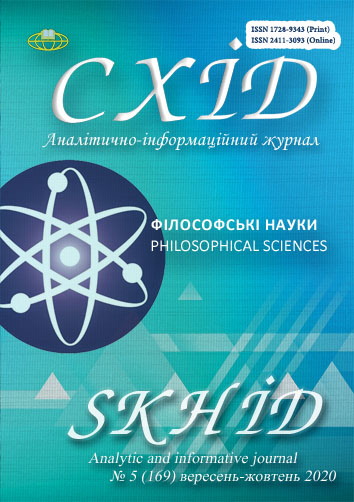SELF-OTHER DIALECTIC, HEGEL, AND THE CONTEMPORARY THEORY OF 'THE POLITICS OF RECOGNITION'
DOI:
https://doi.org/10.21847/1728-9343.2020.5(169).211583Keywords:
Hegel, Identity, Politics of Recognition, Recognition, Self-consciousnessAbstract
This paper approached the concepts of self-other dialectic and "the politics of recognition" from the aspect of Hegel's self-consciousness chapter in the Phenomenology of Spirit. Various authors attribute Hegel as a source and inspiration for the current theories of identity politics. This article is, therefore, focused on examining the implication of Hegel's idea of 'recognition' and 'self-consciousness' on the contemporary debates of identity politics. Hegel has an enormous contribution to the current debate on identity politics. This article shows that with specific reference to the Phenomenology of Spirit, Hegel's understanding of 'recognition' in terms of the dialectic of consciousness is vital to see the contemporary theory of the politics of recognition in a broader epistemological and ontological basis. When it comes to the more practical and empirical political situation of these days, his idea of freedom and recognition has many important insights that support constitutional liberal system to handle 'needs' and 'demands' of recognition raised in identity politics. As Hegel has emphasised in many of his works, in the progress of human history, state (including the established institutions) is the Absolute Spirit that actualises the reciprocal freedom and mutual recognition of individuals in a broader political space. Based on these Hegelian insights, the study concluded that education, deliberative democracy, and institutions are substantial to handle competing 'needs' and 'demands' of recognition in identity politics without granting group rights and interests a constitutional recognition.Downloads
References
Baynes, K. (2002). Freedom and recognition in Hegel and Habermas. Philosophy & Social Criticism, 28(1): 1–17. Doi: https://doi.org/10.1177/0191453702028001587
Burns, T. (2006). Hegel, Identity Politics and the Problem of Slavery. Culture, Theory and Critique, 47(1): 87–104. Doi: https://doi.org/10.1080/14735780600624084
Dewey, J. (1954). The Public and Its Problems. Denver: Alan Swallow.
Dewey, J. (2004). Reconstruction in Philosophy. Mineola, New York: Dover Publication INC.
Douzinas, C. (2002). Identity, Recognition, Rights or What Can Hegel Teach Us about Human Rights? Journal of Law and Society, 29 (3, Setember): 379-405.
Fukuyama, F. (2018a). Against Identity Politics. Foreign Affairs, Sept/Oct, 1–15.
Fukuyama, F. (2018b). "Can liberal democracies survive identity politics?" The Economist Fukuyam's interview, Sept 2018 Retrieved from https://www.economist.com/open-future/¬2018/09/30/can-liberal-democraciessurvive-identity-politics
Grier, T. P. (2007). Introduction, 1(1-14) In Identity and Differ-ence: Studies in Hegel's Logic, Philosophy of Spirit and Poli-tics, State University of New York (USA).
Habermas, J. (1994). Struggles for Recognition in the Democratic Constitutional State. In A. Guttmann (Ed.), Multiculturalism: Examining the Politics of Recognition, Edited and Introduced by Amy Guttmann. (Vol. 2, pp. 105–148). New Jersey: Princeton Press.
Habermas, J. (1985). The Philosophical Discourse of Modernity (F. Lawrence, ed.). Polity Press.
Hegel, G. W. (1977). Phenomenology of Spirit. Translated by A. V. Miller. Oxford, New York, Toronto, Melbourne: Oxford University Press.
Hegel, G. W. (2001). Encyclopaedia of the philosophical sciences. Translated and Edited By Klaus Brinkmann And Daniel O. Dahlstrom. Cambridge University Press.
Ikäheimo, Heikki. (2013). Hegel's Concept of Recognition—What Is It? In C. Krijnen (Ed.), Recognition – German Idealism as an Ongoing Challenge (pp. 11–38). Leiden and Boston: Brill.
Kymlicka, Will. (1995) Multicultural Citizenship. Clarendon Press.
Malesevic, Sinsa. (2006) Identity as Ideology: Understanding Ethnicity and Nationalism. Palgrave: Macmillan.
Procyshyn, A., & Wenning, M. (2019). Recognition and Trust: Hegel and Confucius on the Normative Basis of Ethical Life. Dao, 18(1): 1–22. Doi: https://doi.org/10.1007/s11712-018-9644-4.
Robinson, A. M. (2007). Multiculturalism and the Foundations of Meaningful Life: Reconciling Autonomy, Identity, and Community. Vancouver, Toronto: UBC Press.
Stewart, J. (1994). The Architectonic of Hegel's Phenomenology of Spirit. Philosophy and Phenomenological Research, 55(4): 747–776.
Stewart, J. (2019). Hegel's theory of the emergence of subjectivity and the conditions for the development of human rights. Filozofia, 74(6): 456–471. DOI: https://doi.org/¬10.315¬77/filozofia.2019.74.6.3
Taylor, C. (1994). The Politics of Recognition. In A. Guttmann (Ed.), Multiculturalism: Examining the Politics of Recognition, Edited and Introduced by Amy Guttmann. 1(24-72). New Jersey: Princeton Press.
Tautz, B. (2007). Reading and Seeing Ethnic Differences in the Age of Enlightenment: From China to Africa. Palgrave: Macmillan.
The Federal Democratic Republic of Ethiopia FDRE. (1995). Constitution of the Federal Democratic Republic of Ethiopia. Addis Ababa: Ethiopian Negarit Gazeta.
Toddington, S. (2015). Agency, authority, and the logic of mutual recognition. Ratio Juris, 28(1): 89–109. Doi: https://¬doi.org/10.1111/raju.12030
Williams, R. (2007). Double Transition, Dialectic, and Recognition 2(31-64) in Identity and Difference: Studies in Hegel's Logic, Philosophy of Spirit, and Politics, Edited by Philip T. Grier. State University of New York (USA).
Winkiel, L. (2008). Modernism, Race and Manifestos. Cam-bridge: Cambridge University Press.
Downloads
Published
How to Cite
Issue
Section
License
Copyright (c) 2020 Belayneh Taye Gedifew

This work is licensed under a Creative Commons Attribution-NonCommercial-NoDerivatives 4.0 International License.
1. Authors bear responsibility for the accuracy of facts, quotations, numbers and names used.
2. Manuscripts are not sent back.
3. The publisher does not always agree with the authors' opinion.
4. The authors reserve the right to authorship of the work and pass the first publication right of this work to the journal under the terms of a Creative Commons Attribution-NonCommercial-NoDerivatives 4.0 International License. This license allows others to distribute (copy) the published work for non-commercial purposes, provided there is mandatory attribution to its authors and a link to the first publication in our journal.
5. The authors have the right to conclude separate supplement agreements that relate to non-exclusive work distribution in the form in which it has been published by the journal (for example, to upload the work to the online storage of the journal or publish it as part of a monograph), provided that the reference to the first publication of the work in this journal is included.

